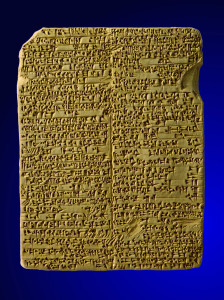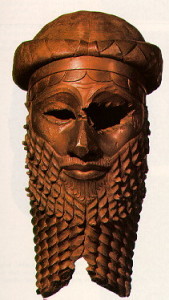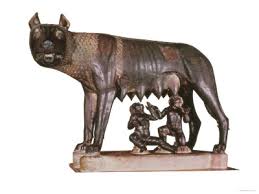[Note: When I began this blog a little over a year ago, I intended to put up a regular series on Prophets and Messiahs through history, and how they relate to the structure of religious and other cults. Alas, I got a little distracted. For months. Sorry about that. But now it’s time to get back to it, in the form of a regular Friday Messiah, and we’ll start with a blast from the very distant past. The introductory articles, which set out some characteristics of cults and messiahs, can be found here and here.]
Look back about forty-four centuries, to the middle of the third millennium BC. In Sumer, Lower Mesopotamia, such cities as Ur, Eridu and Uruk had already been in existence for centuries. Each of the Sumerian city states had its own king, priesthood, and aristocracy, bossing a hardworking and well-taxed populace. The cities competed with each other, made alliances, went to war, prospered, and took turns falling on hard times, in a shifting hegemony: that is, first one would dominate for a while, and then the balance of power would teeter in another direction. But around 2340 BC, something new and different came along.
The key player came out of a previously undistinguished city-state called Kish in the Mesopotamian uplands, an area that had lagged developmentally behind the lowlands of Sumer. His name was Sargon, usually monickered Sargon the Great of Akkad, and he is remembered as the architect of the first great empire—not the first confederacy ever formed by conquest, but certainly a quantum level up from anything seen before. Conquering city-state after city-state in Sumer and Akkad, he eventually ruled as far north and west as the Mediterranean Sea and Anatolia, and eastwards to the borders of Elam. His empire did not last long, just over a century, before it succumbed to the general Early Bronze Age collapse in about 2200 BC; but while it lasted, it was the greatest polity the world had known to that point.
So who was this Sargon person, anyway?
It is quite possible he was a nobody, at least to begin with. He does not even have a real name. Sargon means something like “the true king”, and is thought to be the name he took when he rose to power. We do not know whether he was a charismatic personality, a visionary, a cruel tyrant, a figurehead, or a messianic leader; the stories that have come down to us are patchy and inconsistent, based on incomplete texts ranging from the twentieth to the seventh centuries BC. But there are features of the legends that tie in very well with the sorts of tales that accrete around cult leaders and common-or-garden messiahs.
One version of Sargon’s origins gives a name to his father, while another (later and more legendary) narrative describes him as the son of a high priestess and—nobody. This has been construed as making him either a bastard or the claimed product of a virgin birth. In any case, his mother bore him secretly and then made a little boat of reeds or rushes, sealed it with pitch, and set her baby adrift in the river. Little Sargon floated downstream until a humble gardener or drawer of water, named Akki, found him while drawing up water from the river. Akki adopted the foundling and brought him up in humble circumstances, eventually getting him a job in the palace gardens.
 Sargon was not destined to stay in low estate. The King of Kish saw him and, apparently struck with his fine qualities, appointed the lad to be his cupbearer, setting Sargon’s feet on the first rung of the ladder of imperial success. This came about because the goddess Ishtar loved and favoured Sargon, and was prepared to watch over his path to the top. Once he became part of the king’s court, Sargon was troubled with a prophetic dream (shades of Joseph and Pharaoh), which in turn troubled the King of Kish—largely because the dream was about him (the king) drowning in a river of blood. To avert this doom, the king sent Sargon to another city to deliver a message, which boiled down to “kill this messenger”.
Sargon was not destined to stay in low estate. The King of Kish saw him and, apparently struck with his fine qualities, appointed the lad to be his cupbearer, setting Sargon’s feet on the first rung of the ladder of imperial success. This came about because the goddess Ishtar loved and favoured Sargon, and was prepared to watch over his path to the top. Once he became part of the king’s court, Sargon was troubled with a prophetic dream (shades of Joseph and Pharaoh), which in turn troubled the King of Kish—largely because the dream was about him (the king) drowning in a river of blood. To avert this doom, the king sent Sargon to another city to deliver a message, which boiled down to “kill this messenger”.
Fortunately, with the help of the love-smitten goddess Ishtar, Sargon was able to navigate the hazardous shoals of royal Kish, and end by supplanting the king—the details, alas, are not preserved. At any rate, despite his early disadvantages, Sargon built his own capital at Akkad and proceeded to take over everybody else’s kingdoms as well. That is the bare bones of the story, and it provides a brilliant early illustration of some common messianic (and heroic) motifs.
First, there is the noble but mysterious origin, with overtones of the miraculous. Was Sargon fathered by a god? Was his mother a high priestess? Whoever they were, extraordinary parentage is implied. This is very common. Numerous pretenders or usurpers or on-the-make messiahs fudge their origins to give themselves an appealing pedigree. Numerous ancient legends or official histories explicitly describe their central character as the child of a divine father and a mortal mother, or a virgin birth brought about by a divinity, thus accounting for the child’s specialness and heroic attributes. Alexander, Hercules, Mithras, Lao Tzu, Krishna, Karna of Tibet, the Egyptian pharaohs, Dionysus, Samson, and Jesus, all fit into this category. The hero/messiah’s semi-divine or extraordinary birth is all the more important if his apparent parentage is inconveniently mundane. How can the son of a simple gardener or carpenter or serf possibly presume to be a leader of men? Obviously, the apparent father is not really the father. When we discuss more recent messianic figures, we shall see how they often adapt this principle of mysterious or exotic origins.
 Next, Sargon was effectively abandoned—cast away in a little boat on the river. The parallel is obvious with the much later but considerably more famous Moses, tenderly placed by his mother among the bulrushes of the Nile to save him from pharaoh’s edict that all male Hebrew babies were to be killed; he was plucked from the water by, ironically, Pharaoh’s own daughter. But similar details appear in, for example, the story of Romulus and Remus, the founders of Rome, twins born when the god Mars could not keep his hands off the vestal virgin Rhea Silvia. As the products of such a sinful and forbidden alliance, the babies were cast adrift on the Tiber in a basket. These, and other baby-in-a-basket stories, are part of a more general “Hidden Child” motif, where the birth of a hero is accompanied by dire prophecies—often, that the child will cause the downfall of the city or the reigning king. The king orders the child to be killed as a precaution, commonly by exposure—but the child survives. The underling entrusted with the murder may take pity on the child, as in Oedipus, or the fine folkloric example of Snow White and the Seven Dwarves. Or, if exposed on a hillside, or set adrift on the water, the child will be found and rescued.
Next, Sargon was effectively abandoned—cast away in a little boat on the river. The parallel is obvious with the much later but considerably more famous Moses, tenderly placed by his mother among the bulrushes of the Nile to save him from pharaoh’s edict that all male Hebrew babies were to be killed; he was plucked from the water by, ironically, Pharaoh’s own daughter. But similar details appear in, for example, the story of Romulus and Remus, the founders of Rome, twins born when the god Mars could not keep his hands off the vestal virgin Rhea Silvia. As the products of such a sinful and forbidden alliance, the babies were cast adrift on the Tiber in a basket. These, and other baby-in-a-basket stories, are part of a more general “Hidden Child” motif, where the birth of a hero is accompanied by dire prophecies—often, that the child will cause the downfall of the city or the reigning king. The king orders the child to be killed as a precaution, commonly by exposure—but the child survives. The underling entrusted with the murder may take pity on the child, as in Oedipus, or the fine folkloric example of Snow White and the Seven Dwarves. Or, if exposed on a hillside, or set adrift on the water, the child will be found and rescued.
A third common motif found in the Sargon legend is that the miracle child is raised by the equivalent of a blue-collar family—or, in some variants, by animals or hermits—until he emerges from obscurity to realize his (occasionally her) destiny. Think again of Romulus and Remus, suckled by a wolf; or Moses again, in a very neat reversal: the son of slaves, raised as a prince by Pharaoh’s daughter. But in most cases where these motifs apply, the future hero/messiah grows up hidden behind a false identity, a pearl in a dungheap, until his exceptional true nature is dramatically revealed.
Different combinations of these motifs show up regularly in messianic narratives, adapted to the times and the circumstances. In many cases, it is clear that the narratives are at least partly adapted from earlier, similar stories; others look like having entirely separate origins, like a wheel being invented over and over again in different places, which is itself interesting.
But these are not the only common motifs in the annals of messianic leaders. Next week: Akhenaten of Egypt.


